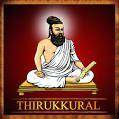[GHHF] Bala Samskar Kendra in Tamil Nadu – Students learned about the greatness of Tirukkaral, his poems and their eternal wisdom.
 George Bernard Shaw
George Bernard Shaw
“The apparent multiplication of gods is bewildering at the first glance, but you soon discover that they are the same GOD. There is always one uttermost God who defies personification. This makes Hinduism the most tolerant religion in the world, because it’s one transcendent God includes all possible gods. In fact, Hinduism is so elastic and so subtle that the most profound Methodist, and crudest idolater, are equally at home with it.”
Global Hindu Heritage Foundation is extremely happy to recognize the need to preserve and protect the traditions and customs. We feel that it is important to acknowledge the literary contributions of many scholars. These are the scholars who strengthened our culture, morals and ethics creating pride among Hindus. Tamila Nadu Bala Samskar students are taught about the greatness of Tirukkaral and his poems on various topics that cover the entire gamut of human life.
The Tirukkuṟaḷ or shortly the Kural, is a classic Tamil language text consisting of 1,330 short couplets, or kurals, of seven words each. The text is divided into three books with aphoristic teachings on virtue (aram), wealth (porul) and love (inbam), respectively. Considered one of the greatest works ever written on ethics and morality, it is widely acknowledged for its universality and secular nature. Its authorship is traditionally attributed to Valluvar, also known in full as Thiruvalluvar. The text has been dated variously from 300 BCE to 5th century CE. The traditional accounts describe it as the last work of the third Sangam, but linguistic analysis suggests a later date of 450 to 500 CE and that it was composed after the Sangam period.
Written on the ideas of ahimsa, it emphasizes non-violence and moral vegetarianism as virtues for an individual. In addition, it highlights virtues such as truthfulness, self-restraint, gratitude, hospitality, kindness, goodness of wife, duty, giving, and so forth, besides covering a wide range of social and political topics such as king, ministers, taxes, justice, forts, war, greatness of army and soldier's honor, death sentence for the wicked, agriculture, education, abstinence from alcohol and intoxicants. It also includes chapters on friendship, love, sexual unions, and domestic life. The text effectively denounced previously held misbeliefs that were common during the Sangam era and permanently redefined the cultural values of the Tamil land.
His poems addressed various issues applicable to cross sections of people. How should a man live? What are the virtues to be practiced by him and what, the code of conduct? What the duties of the various Ashramas into which man’s life falls? How should a king rule his people and protect them? What is the code of conduct prescribed for him? How can the best be got out of domestic life? These and similar questions have been admirably answered in this beautiful work.
Thirukkural attempts to provide guidelines, not for society in general but for the individuals: the ascetic, the family member, the father, mother, the son, the monarch, the minister, the ambassador and in general to the individuals in society with responsibilities to themselves and others.
It is clear from the following fundamental noble ideas referred to by Thiruvalluvar that he had a firm faith in the Law of Karma. “Those that hold on to the feet of the supreme Lord will cross the ocean of Births”, “From the control of the senses arises the power to save oneself in seven births. “Death is but sleep’’. “Birth is only wakening from sleep.” “Liberation can be secured through true wisdom.” “Detachment is the means to come out of cycle of Births” “He who lives with righteousness will attain Heaven.” “He who affords hospitality to a guest will go to the celestial region.”
Few Examples of his poems:
1) Choosing harsh words over gentle words is no different from eating a raw fruit when a succulent and ripe fruit is available.
2) A physical burn from a fire will heal over time. The pain caused by harsh words from the tongue will never heal.
3) To be patient with those who are mean to us, just as the earth bears those to dig her, is a high virtue.
4) When the food for the ears dries up, then (and only then) is food for the stomach necessary.
5) The path of love is the higher path. Those who don’t possess love are no different from a bag of bones fitted with clothes.
6) The people who hope to cross the ocean of Samsara are those who surrender to God.
7) “The music from the flute is mellifluous!” “The music from the lute is lovely!” This will be said by those who haven’t had the pleasure of hearing the most beautiful music of all – prattling from their toddlers.
8) Even if someone has harmed you, you should still do good to them.
According to Manarishi Suddhananda Bharati, ‘The Thirukkural is the guiding light to humanity. It leads one to live in moral purity, in eternal wisdom, in spiritual knowledge, and in perfect prosperity, wealth and health. It is a faithful friend to the family man, to the mother, to children, to teachers, artists, rulers and politicians.
DONATIONS
PayPal Method: To donate visit our website: savetemples.org. Click on the Donate button, then press the Purpose category, and select the program.
By Zelle: ghhfusaorg@gmail.com
By Check: Or you can send a check payable to GHHF, . It is tax-deductible.
RUPEES, if you would like to contribute to rupees, please either call or send an email. We will call you back to give you the required information
For more information, call Prakasarao Velagapudi at 601-918-7111; Email: ghhfusaorg@gmail.com





















 Urgent support needed for Bangladesh Hindus
Urgent support needed for Bangladesh Hindus 







